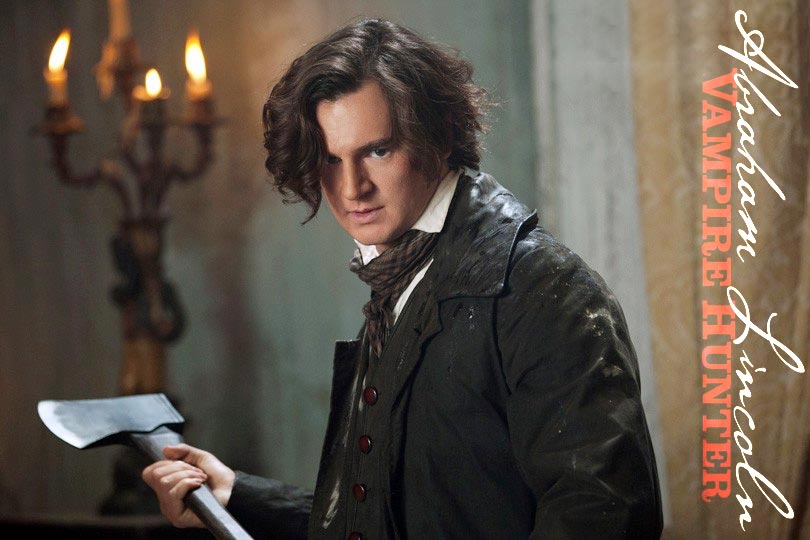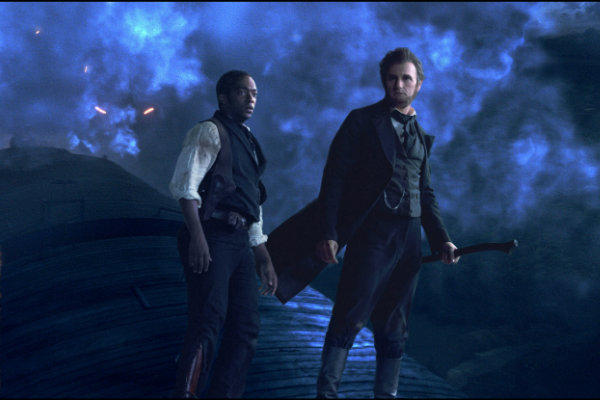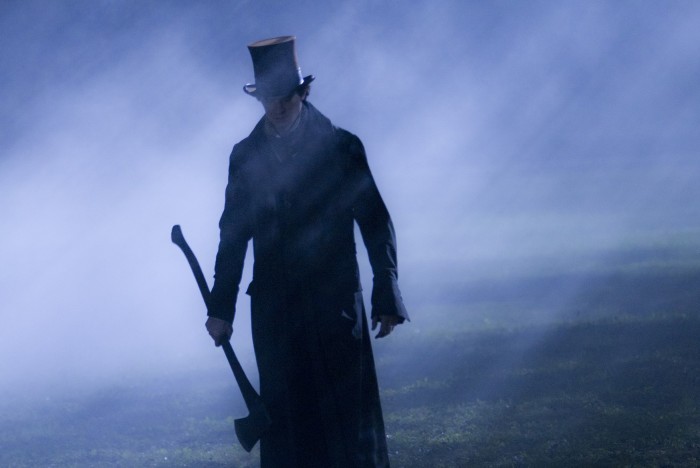|
Abraham
Lincoln: Vampire Hunter
Reviewed by
Morgan Qasabian on
August 3rd, 2012
Fox presents
a film directed by
Tim
Bekmambetov
Screenplay
by
Seth Grahame-Smith, based on his novel 'Abraham Lincoln, Vampire Hunter'
Starring:
Benjamin Walker, Marton Csokas, Dominic Cooper, Mary Elizabeth Winstead
and Anthony Mackie
Running
Time:
105 mins
Rating:
MA
Released:
August 2nd,
2012
|
3/10
|
|
Abraham Lincoln: Vampire Hunter traces the
trajectory of Lincoln’s (Benjamin Walker) life from early childhood to
the eve
of his death. The film starts with Abraham witnessing the murder of his
mother
by the vampire Jack Barts (Marton Csokas) and with Lincoln as a young
adult
attempting to avenge his mother’s murder. This attempt at revenge goes
awry and
Lincoln is saved by Henry Sturges (Dominic Cooper). Henry takes him in
and gives
Lincoln an education on vampires and how to kill them. Lincoln moves to
Springfield, Illinois and works in Joshua Speed’s (Jimmi Simpson)
general
store, studies the law and kills vampires by night. He agrees to only
kill
vampires Henry directs him to. It is
here that he meets his future wife, Mary Todd (Mary Elizabeth Winstead)
and is
reunited with his childhood friend Will Johnson (Anthony Mackie). Years
later, President
Lincoln learns that the vampires are fighting with the Confederates, so
he
takes it upon himself to fight the fight his generals cannot.
The film is
bookended with a rather deeply pitched Lincoln intonating, “History
prefers legends to
men, nobility to brutality, soaring speeches to quiet deeds. History
remembers
the battles, but forgets the blood.” Herein lies the premise of the
film: the
history books are wrong because the 16th President of the
United
States was a vampire hunter! It is part of the genre that blurs
historical fiction and revisionism that has popped up in recent years,
the best
example of which is 300 (2006). I
call it the new wave of historical revisionist science fiction. It is
very
interesting that such a major retelling of Honest Abe’s life could be
made into
a film. Lincoln’s legacy is still a divisive topic for Americans, with
both
sides of the political divide laying claim to him. This is delicate
stuff and
something not to be trifled with. The film can’t but help ride
roughshod over
any notion of tact—quite literally in one migraine inducing scene
featuring a
myriad of poorly computer generated mustangs.

The craft of
the film is bungled to say the least. The first thing that one notices
when
donning the cumbersome light absorbing 3D glasses (they always makes me
self-aware of my nose, forcing me to adjust and readjust my glasses for
the
duration of the film) is that the colour of the film is incredibly
desaturated,
creating a pseudo-sepia quality to the film. When this is combined with
the
frenetic action sequences, it makes for unwatchable cinema. The action
scenes
follow the basic structure of an explosion of energy (that is
incredibly hard
to keep track of), followed by super slow-motion, ending with the
dispatching
of the vampire. The CGI employed truly makes the film look like a video
game,
which would explain the killer c-c-c-combo Lincoln uses again and again
and
again. It is not just the action scenes that follow a fast-slow
pattern, but
the pace of the film as a whole.
Abe’s
childhood to the obligatory training montage seems to take only a few
minutes,
with one scene jumping to the next as quickly as it appeared on the
screen.
Then the pace slows down. Way down. The middle of the film drags on, as
if to
compensate for the previous leaps in the story. Then there is the third
act,
which begins by Abe hanging up the axe of his youth, and instead
donning a
beard and wrinkles to fight Civil War and the vampires that aid in the
Confederate cause. The Civil War seems to consist of the Confederate
attack on
Fort Sumter and Gettysburg, with vampires filling the ranks of
Pickett’s
division that made the charge at Gettysburg. The treatment of the Civil
War is even
more hole-laden than this. When he was still studying the law Lincoln
visits
the head vampire Adam (Rufus Sewell). Adam tells Abe that in his five
thousand
years of existence he’d seen Jews enslaved by the pharaohs, Christians
burned
by the Romans, and now the vampires want a nation for their own kind.
This
gives an interesting twist to Abraham’s concern to uphold the Union
when it is
revealed the vampires have found common cause with the Confederates:
now the
Union is for all living humans, and not the undead. Though, this
insight is
tarnished with the film’s attempt to make Lincoln into a principled
abolitionist, which is introduced to him in his youth by his mother.
She tells him
"until
everyone is free, we are all slaves." It is this latter motivation that
the film sets out to portray as the more important of the two.

The film is full of many what-could-have-been
moments. Just as the
script transformed Lincoln’s realpolitik aim of preserving the Union,
to a
universalist humanist concept, the script could have explained
Lincoln’s
suspension of habeas corpus as a way of combating vampires; in keeping
with the
rehabilitation of Lincoln’s image that the film attempts for example. I
was happy
to see a particular ball scene at Adam’s plantation. I thought the
director
Timur Bekmambetov was paying homage to classic vampire films such as
Roman
Polanski’s Dance of the Vampires but
the scene lasted barely a few seconds. It was one of the few parts I
wished
were longer, and wouldn’t have minded if other scenes were cut for its
prolongation.

This is not to say that it is a lazy
script. There are many attempts at plot twists and turns, humour and
other
dramatic devices. None of which really worked on me, as I did not feel
invested
in the story to be moved as much as scriptwriter Seth Grahame-Smith and
Bekmambetov intended. There are shocking revelations about Lincoln’s
mentor
Henry and intrigue involving double and triple crossings for example. What-could-have-been coolest of all, a
dramatically ironic conversation between Henry and Lincoln at the end
of the
film. I’ll leave it up to the readers’ minds what this could be about.
Protip:
it involves going to the theatre. At this point in the film,
specifically the
end, I couldn’t really appreciate it. Not after seeing what had
preceded it. Overall
Abraham Lincoln: Vampire Hunter is a
disappointing film, in part because of the editing and craft of the
film, as
well as the script. It isn’t just history that prefers legends to men,
Hollywood does as well. But for Hollywood, the sillier and more
preposterous
the better!
|